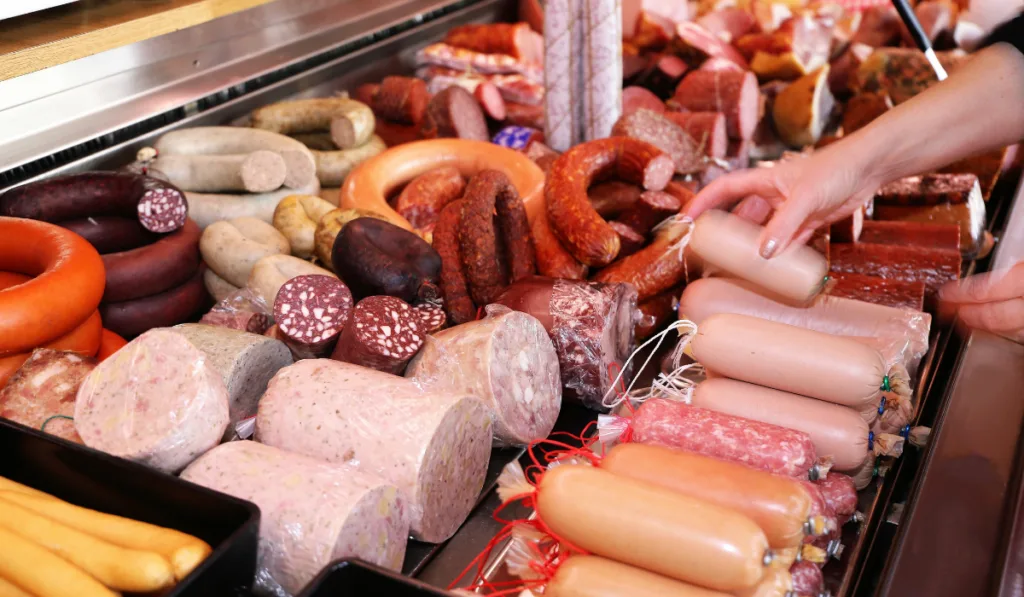Did you ever take the cover off the deli meat pack to fix yourself a sandwich, only to find out it’s gone bad? Well, you’re not the only one.
Meat can go bad very quickly if you don’t store it right, begging the question, exactly how long does deli meat last?
Deli meat lasts about five days if you store it in the fridge, but it can last for months in a freezer, or even years with some other methods. Meat is very vulnerable to rotting and you have to store it carefully.
There are many questions we have to answer, then. What can you do to make your deli meat last longer? What’s the best way to store deli meat? And how can you tell if your meat has gone bad?
Find out the answers to all those questions and more, below.

Table of Contents
How Long Does Deli Meat Last?
Did you know that meat is the quickest food to go bad out of all the food groups?
If you have fruits, veggies, meat, fish, and dairy products in the fridge, the meat will go bad first out of all those foods.
After opening it, deli meat can’t last longer than five days in a fridge, provided that you keep it in a closed container and at the appropriate temperature (below 40°F).
While the deli meat is still in the original, unopened packaging, it can last for up to two weeks in the fridge, but as soon as you open it, the five-day timer starts counting down!

How to Make Deli Meat Last Longer
The simplest way to make deli meat last longer is to freeze it. Frozen deli meat can last for months, potentially even years, as it doesn’t go bad at all.
However, thawed deli meat isn’t the same as fresh deli meat.
Another method of preserving deli meat for a long time is by freeze-drying it.
Freeze-drying is a new method of long-term storage, and it’s so far proven to be incredibly effective, with freeze-dried meats having the potential to stay safely stored for up to 25 years.
Unfortunately, freeze-dryers are a bit expensive, and freeze-drying may not be an option for everyone.
Finally, we have meat dehydration. This is a very reliable way to make your meat last, and humans have been using it for millennia.
Dry jerky and dry sausages can last for at least 6 months if they’re sealed in vacuum bags and kept in a cold, dark room. If you store them in a freezer, they can last much longer.

How Do I Know If My Meat Has Gone Bad?
There are a few obvious tell-tale signs that show that your meat has gone bad – the most important one is the smell. If your meat has gone bad, it will develop a rancid smell and you won’t be able to ignore it.
In fact, the human sense of smell, while incomparably weaker than that of wild animals, is particularly sensitive to the smell of rotten food.
So, the smell will be unbearable, and you won’t be able to even stand near the meat, let alone eat it.
This smell is caused by bacteria and fungus eating your meat and releasing a smelly substance (called geosmin).
You’ll notice some discoloration if your meat was exposed to light, and you may notice that the meat has a less intense taste. This is completely normal, as light exposure degrades vitamins and riboflavin.
To clarify, light doesn’t make your food bad, but it affects the taste and the way it looks.
As your meat goes bad, it may also lose its consistency and firmness.
These are the three telltale signs of meat gone bad. These include rotten smell, discoloration, and loss of firmness.
Since eating rotten meat can cause severe food poisoning, we recommend you throw away every meat that has gone bad.

What Makes Meat Go Bad?
There are four major factors that decide how fast your food will go bad: oxygen, moisture, temperature, and light.
Oxygen is vital to the bacteria and fungi working on the decomposition of your food. If you cut off the oxygen supply, these organisms die. This is why you should vacuum seal your meat before you freeze it.
Secondly, moisture is essential for the life of microorganisms, which is why dehydrating foods is so effective at keeping these organisms away. This is why storage labels always say to keep the product in a cool, dry room.
Then, we have low temperatures. Microorganisms go into hibernation if the temperatures are too low – this is why it’s so effective to store meat in a freezer.
A similar rule applies to high temperatures – not only does cooking meat make it tastier (and easier to chew), but it also kills all microorganisms.
Finally, as explained before, light exposure leads to discoloration and loss of taste.
To Sum Up – Deli Meat Doesn’t Last Long
If you’re going to eat your meat quickly, feel free to store your deli meat in the fridge. It can last up to five days there before it goes bad.
For long-term storage, however, you’ll have to freeze, freeze-dry, or dehydrate the meat.
Freeze-drying is by far the best method of deli meat storage, but it’s often not an option because freeze-dryers are so expensive.
Resources
- https://ask.usda.gov/s/article/How-long-does-lunch-meat-stay-fresh
- https://extension.usu.edu/preserve-the-harvest/files/Food-Storage-Booklet.pdf
- https://academic.oup.com/chemse/article-abstract/17/1/23/268382?redirectedFrom=fulltext
- https://www.usda.gov/media/blog/2016/03/25/protecting-your-family-food-spoilage
- https://extension.usu.edu/preserve-the-harvest/research/buying-a-home-freeze-dryer-what-to-know-before-you-go
